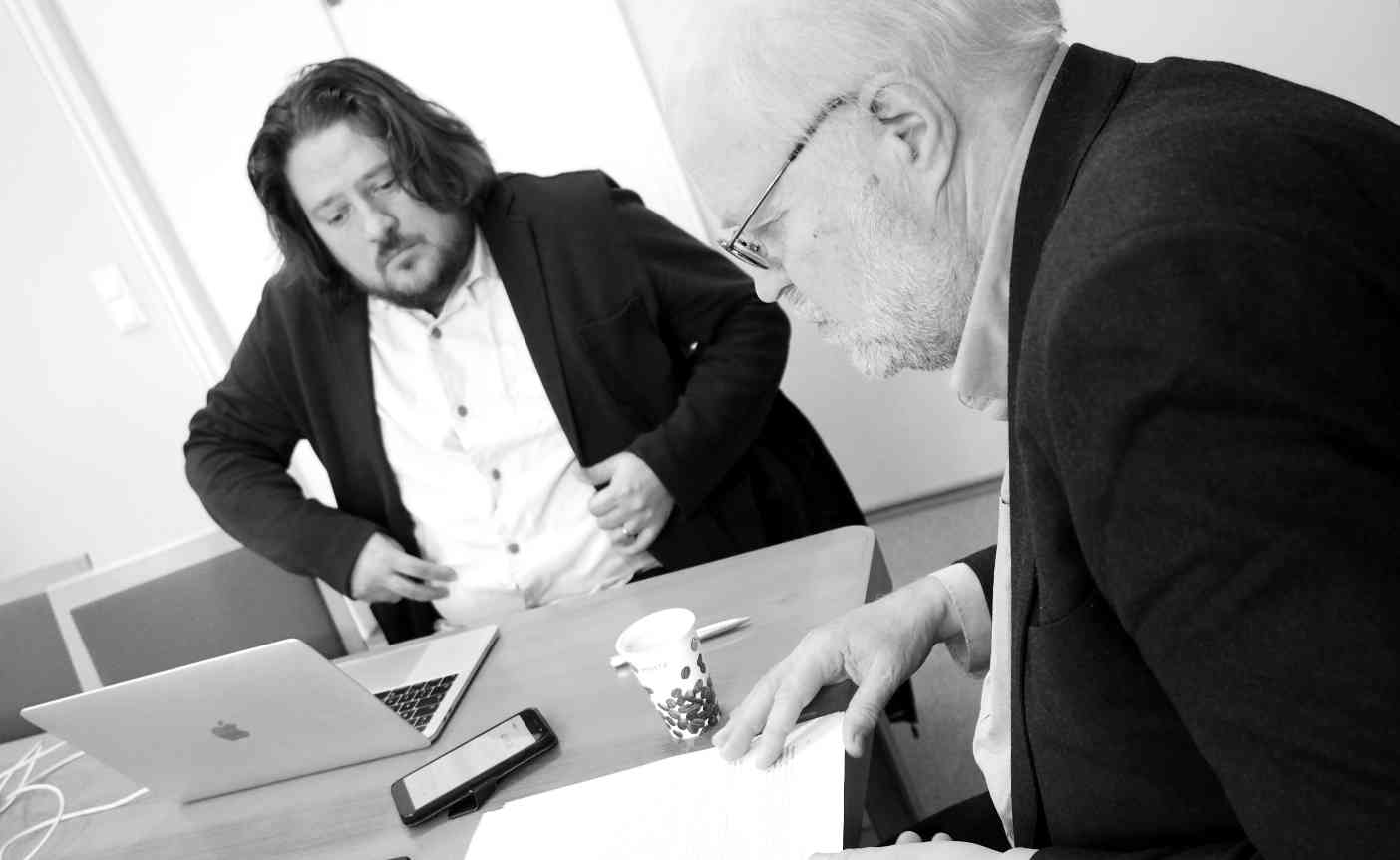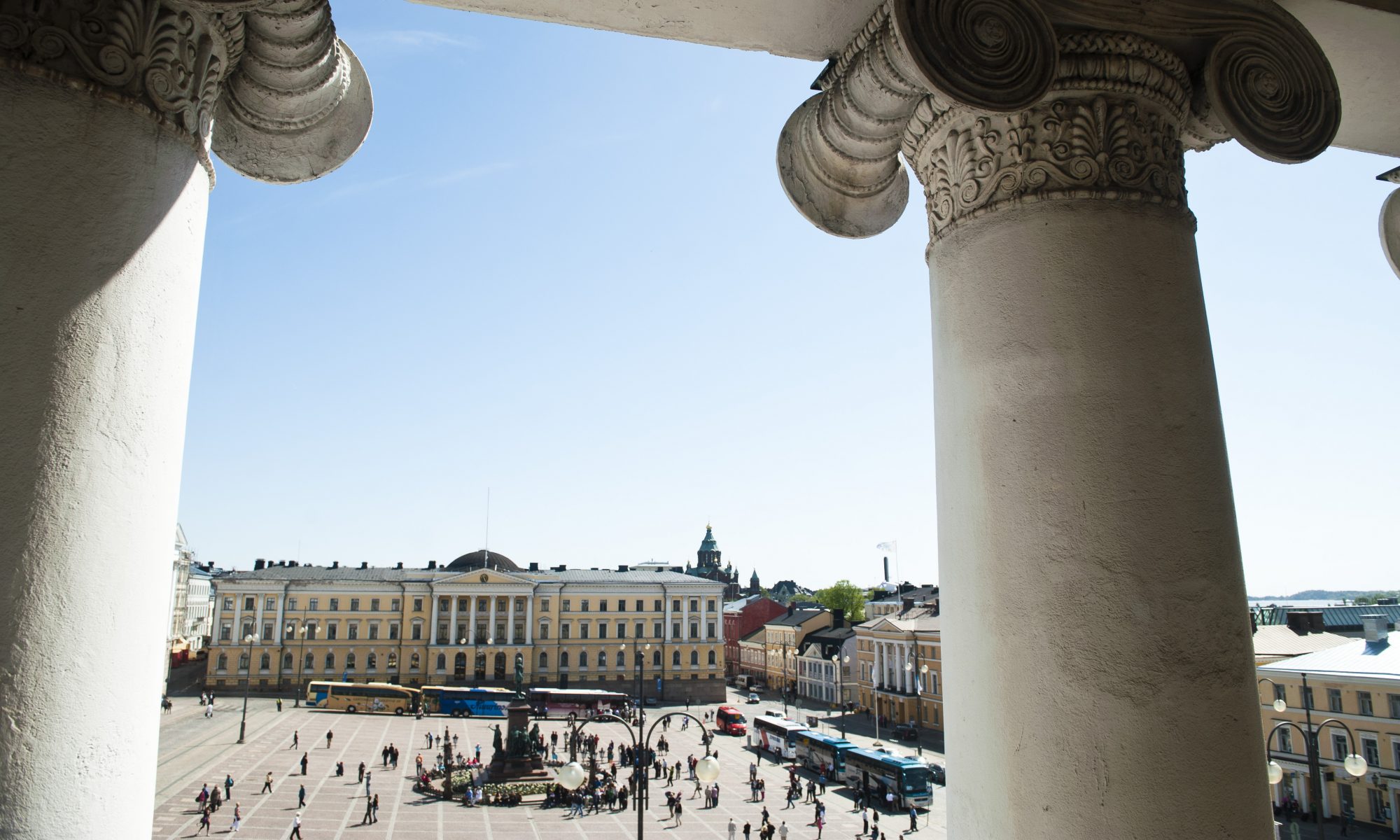Think Open 2018 revisited! The first article in the blog on 7 May 2018 was a dialogue interview between vice rector Jouko Väänänen and associate professor Mikko Tolonen. The article covered open science themes extensively. In the new review of the debate five years ago, Tolonen highlights the importance of practical solutions in promoting open science, and he uses the DARIAH-FI network as an example.
(Tämä artikkeli on saatavissa myös suomeksi.)

In the first article of the Think Open blog, The battle over data has begun – Jouko Väänänen and Mikko Tolonen discuss digitalisation and open science (7.5.2018), Jouko Väänänen, vice rector for research at the University of Helsinki, and Mikko Tolonen, associate professor of digital humanities, discussed the topics of the new blog, such as digitalisation in different disciplines, open access publishing methods and the future of open research data.
Based on a fresh review of the dialogue interview, Tolonen outlined three points, the first of which underlines the importance of understanding research practices.
”Open science progresses by making sustainable choices that guide the actions of researchers and stakeholders. Research must be at the heart of what we do, otherwise we will be led astray. The diversity of the research community creates the problem of a lack of commonality of centralised solutions. This was already known at the time of the previous article, but solutions were missing. To some extent they are still missing, but steps have been taken in the right direction. In the humanities, for example, DARIAH-FI has been set up in Finland, which, together with the FIN-CLARIN consortium, serves as an infrastructure for open research in the humanities and as a platform for promoting best practices in open research data”, Tolonen says.

Progress has been made, structures have been created
Another point Tolonen makes is that there has been a gradual shift from awareness-raising in universities and among researchers to the creation of structures that support practices.
”In the past, a lot of time and energy went into waking people up. Reaching out and engaging researchers is still important – and it’s also difficult, because no one has extra time. At the University of Helsinki, we have made progress in this respect by creating an open science coordination group between the university’s strategic management and the faculty level. The group aims to guide the implementation of the various pillars of open science – which is, of course, the responsibility of the faculties – at the university”, Tolonen says.
Progress has been made on many levels – this is Tolonen’s third observation.
”When you consider the situation of Finland and the University of Helsinki internationally and from the perspective of how open science is represented in the research strategy and how it has been implemented in the everyday life of researchers, we are not doing too badly. For some years I have been a member of the LERU’s (European Association of Research Universities) ad hoc group on open science, which is a good place to hear what is happening elsewhere. It is precisely from the point of view of systematically promoting open science that we are in a pretty good position, both in Finland and at the University of Helsinki, although we still have work to do.”
When you consider the situation of Finland and the University of Helsinki internationally and from the perspective of how open science is represented in the research strategy and how it has been implemented in the everyday life of researchers, we are not doing too badly.
However, not everything has gone smoothly.
”Of course, without dealing with the legislative issues, nothing will work. For example, the fact that the online material of the Finnish internet harvested over the past decade by National Library is still not available for research is both sad and unfortunate. In principle, everything would be ready, but there is no permission for research. This is an either-or question, and in five years nothing has changed in this respect, unfortunately.”
Practical solutions for data sharing
A good example of understanding practical research practices and identifying research data bottlenecks is the solution-oriented collaboration on data between memory institutions.

”In the humanities, we have used the national DARIAH-FI and FIN-CLARIAH networks to build an open access research data cluster around the services of the CSC – IT Center for Science. We will do this in partnership with memory institutions, whose data is central to the human sciences. To put it simply, we are building a platform where memory institutions can bring their data into the digital research environment at the CSC, where DARIAH-FI will process it for researchers. At the same time, the responsibility for promoting research data in research is transferred to researchers, as is the responsibility for openly sharing and scaling up results. This will take the pressure off memory institutions to build research services that can be expensive.”
”For example, the digitalisation of visual culture research requires that the data is more accessible. Well, that’s why one of the next steps for DARIAH-FI is to bring the visual materials through Finna to the CSC service and into DARIAH-FI. What I talked about in the article five years ago has now been sort of kick-started at a national level in the human sciences. Although there is still work to be done for the next five years, I would highlight DARIAH-FI as a sign of how our fields have moved forward in terms of research data”, Tolonen says.
To put it simply, we are building a platform where memory institutions can bring their data into the digital research environment at the CSC, where DARIAH-FI will process it for researchers.
Collaboration with commercial publishers
The blog article from five years ago, in its very title, raises the issue of ownership of research data. Tolonen said at the time: ”The publishers have recognised that money will be made with research data in the future. Journals used to be the thing previously; nowadays it is data mining.” Five years later, the struggle is still on.
”Working with commercial scientific publishers remains a tricky issue. Research data issues in general are an area where more coherence at the level of individual research projects and broader strategic thinking is needed. Fortunately, we have strong players at EU level who are pushing the issue forward, trying to find the best solutions and trying to balance the activities of commercial publishers”, says Tolonen.
Research data issues in general are an area where more coherence at the level of individual research projects and broader strategic thinking is needed. Fortunately, we have strong players at EU level who are pushing the issue forward, trying to find the best solutions and trying to balance the activities of commercial publishers.
DARIAH-FI, which Tolonen praises, is also a good example of how to collaborate with commercial actors in the open use of research data.
”The Reception Reader tool implemented in the DARIAH-FI environment (see also the recent article, Reception Reader: Exploring Text Reuse in Early Modern British Publications) was the subject of a separate contract with Gale. This was seen, for example, by Jisc (a British not-for-profit IT services company) as an exceptional step forward in the use of closed data for research. And this brings us to the relevant question for us, that of derivative research data generated – through research use – from data owned by a scientific publisher and its open use. In my view, the openness of research data will go forward step by step, building on such cases. With these cases, the commercial actor also realises that use cases and research services will emerge for their data that they might not even be able or willing to produce themselves. This benefits everyone, researchers and commercial publishers alike. However, this does not necessarily happen by first defining and then maybe doing something, but by individual actors taking things forward – and then trying to scale this up”, says Tolonen.

”There is growing pressure to use data in research”
In five years, solutions have been put in place to support research, and Tolonen says we must continue on the path of building infrastructure.
”There is growing pressure to use all kinds of data in research as methods evolve and opportunities grow. To do this, we need the infrastructure to make this possible. As has been known for some time, sitting on your data – as opposed to using it for research – does not necessarily benefit anyone in the long run. This is true for a wide range of memory institutions, as well as for commercial players. This creates pressure for change, which is then unleashed through different routes.”
The above article has mainly focused on data-related issues, but the openness of research publications – discussed by Tolonen and Väänänen 2018 – is not yet a settled issue.
”Change in the openness of scientific journals has been regrettably slow, despite the determination of the various players and the tightening of criteria by funders. Implementing the overall strategy for open science at university level is of the utmost importance. Fortunately, sensible steps have been taken, although changing the everyday life of a researcher is a difficult task. In any case, the first step is to understand that waving your hands is not enough. This is why I am so proud of the DARIAH-FI project”, says Mikko Tolonen.
Think Open 2018 revisited:
- Open science develops when practical solutions support researchers – interview with Mikko Tolonen (12.5.2023)
- Does the researcher have time to manage the data? According to Susanna Nykyri, what is needed now is ”investment in time management” (16.5.2023)
- AVOTT has continued on the path set by ATT – Finland has created its own model for national cooperation in open science (17.5.2023)
